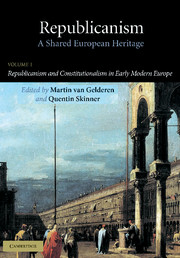Book contents
- Frontmatter
- Contents of Volume I
- Contents of Volume II
- Acknowledgments
- Introduction
- Part I The Rejection of Monarchy
- 1 ‘That a Republic is Better than a Monarchy’: Anti-monarchism in Early Modern Dutch Political Thought
- 2 Anti-monarchism in English Republicanism
- 3 Anti-monarchism in Polish Republicanism in the Seventeenth and Eighteenth Centuries
- 4 Classical Republicanism in Seventeenth-century England and the Netherlands
- Part II The Republican Citizen
- Part III The Republican Constitution
- Bibliography
- Contributors
- Index of Names of Persons
- Index of Subjects
2 - Anti-monarchism in English Republicanism
Published online by Cambridge University Press: 15 December 2009
- Frontmatter
- Contents of Volume I
- Contents of Volume II
- Acknowledgments
- Introduction
- Part I The Rejection of Monarchy
- 1 ‘That a Republic is Better than a Monarchy’: Anti-monarchism in Early Modern Dutch Political Thought
- 2 Anti-monarchism in English Republicanism
- 3 Anti-monarchism in Polish Republicanism in the Seventeenth and Eighteenth Centuries
- 4 Classical Republicanism in Seventeenth-century England and the Netherlands
- Part II The Republican Citizen
- Part III The Republican Constitution
- Bibliography
- Contributors
- Index of Names of Persons
- Index of Subjects
Summary
In the Review and Conclusion to Leviathan, Thomas Hobbes sets out the terms on which individuals can submit to the new republican régime in England – an undertaking prompted, he says, by the failure of ‘divers English Books lately printed’ to explain properly the relationship between conquest and consent. Having remedied this failure, he then turns, somewhat abruptly and surprisingly, to remedy a lapse of his own. In Chapter 35 of Leviathan he had argued that when the scriptures spoke of the kingdom of God this was not to be interpreted metaphorically but taken literally, as signifying a commonwealth ‘wherein God was King, and the High Priest was to be (after the death of Moses) his sole Viceroy, or Lieutenant’ (Hobbes 1996: 282, 484; see Pocock 1971b: 170–4). Hobbes now finds this account of the Jewish commonwealth incomplete in that he ‘omitted to set down who were the officers appointed to doe Execution; especially in Capitall Punishments’. What concerns him in particular is that the judicial practice whereby ‘he that was convicted of a capitall Crime, should be stoned to death by the People; and that the Witnesses should cast the first stone’ had not been ‘thoroughly understood’.
- Type
- Chapter
- Information
- RepublicanismA Shared European Heritage, pp. 27 - 42Publisher: Cambridge University PressPrint publication year: 2002
- 3
- Cited by

